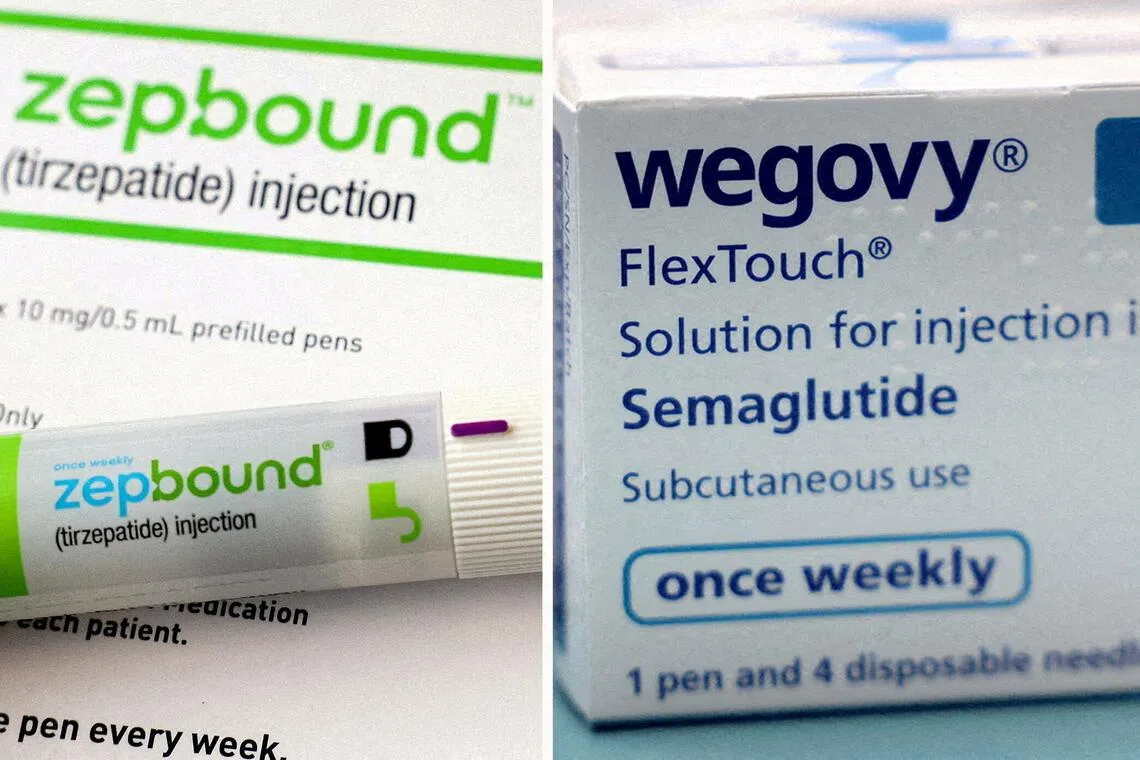China’s first weight loss drug emerges with its nascent market poised for rapid growth
Sign up now: Get ST's newsletters delivered to your inbox

Weight-loss drugs Zepbound by Eli Lilly & Co and Wegovy by Novo Nordisk. The pharmaceutical giants are facing their first serious rival in China.
PHOTO: REUTERS
Hong Kong – Novo Nordisk and Eli Lilly & Co, the pharmaceutical giants dominating the global obesity drug market, now face their first serious rival in China.
Suzhou-based Innovent Biologics secured approval last week for its treatment mazdutide, a turning point in China’s efforts to combat rising obesity and diabetes rates with local innovation.
With more than 600 million Chinese adults projected to be overweight by 2050, the emergence of a viable local alternative to Novo and Lilly’s blockbuster GLP-1 treatments could make weight loss drugs more accessible in the world’s second-largest economy.
China’s nascent weight loss drug market is poised for rapid growth, with analysts estimating it could grow to between US$5.6 billion (S$7.2 billion) and US$11.4 billion a year. While China still accounts for just a fraction of the projected US$150 billion global pie, a raft of home-grown treatments and cheaper generics could significantly improve the availability – and affordability – of the medication.
The country has a pipeline of more than 30 late-stage obesity drug candidates under development, according to LEK Consulting. Several firms have already licensed their drugs to US or European drugmakers like AstraZeneca and Merck & Co for further clinical development outside the country.
Local biotech firms are promising to overcome the limitations of current treatments, including creating long-awaited GLP-1 pills that are just as effective and safe as weekly injections peddled by Novo and Lilly.
Leading insulin producer Gan & Lee Pharmaceuticals is pushing ahead a longer-acting drug that can be taken every two weeks, instead of weekly. Laekna is developing a treatment that would help patients preserve more muscle – a common concern among GLP-1 takers – while still losing fat. Hangzhou Sciwind Biosciences expects China will approve its drug ecnoglutide, which led to more than 15 per cent weight loss after 48 weeks when given at the highest dose, in early 2026.
“Multiple Chinese biopharma are developing differentiated and competitive candidates and have the potential to lead the direction of weight loss drug research and development,” said Dr Chen Chen, head of China healthcare research at UBS Securities.
Competition is expected to rise in 2026 when cheaper alternative versions of semaglutide – the active ingredient in Novo’s Wegovy – launch after semaglutide’s China patent expires. This could pressure drugmakers to lower treatment prices and could quickly expand access to the drugs across a country of 1.4 billion people.
Compared with Western countries where popular GLP-1 drugs are widely available for people looking to lose weight, the current penetration rate for such drugs in China is “extremely low”, said UBS’ Dr Chen. Novo started rolling out obesity treatments in China only in 2024, and Lilly earlier in 2025.
A government-led campaign to curb obesity and establish new weight management clinics has fuelled demand, which is now outstripping supply and leading to stock shortages, said Dr Shawn Qu, chief of SinoUnited Health’s Endocrinology, Metabolism and Thyroid Centre in Shanghai.
“It’s far from meeting the clinical need,” said Dr Qu, who is also an adviser to China’s National Health Commission weight management committee.
Foreign medicines have long enjoyed higher trust and recognition in China, where its biotech industry is still overcoming past quality issues.
Scepticism about the quality of domestic generic medicines also remains high among Chinese – and rare backlash from doctors earlier in 2025 fuelled questions about whether government efforts to slash treatment prices had come at the cost of efficacy.
The relative price differences between foreign and domestic weight loss drugs could be much smaller than in PD-(L)1 medicines used to treat cancer, said Mr Yang Huang, senior analyst for China healthcare research at JP Morgan.
He said: “We think foreign companies could be more willing to lower prices for their weight loss drugs in China, as we have seen in the US market where major weight loss drug players have started engaging in price competition.”
Going forward, “you’ll see a lot more competitors in the China market versus anywhere else”, said Mr Justin Wang, head of LEK’s China practice. “It will be unlikely for one or two companies to dominate the whole market.” BLOOMBERG


